The Cognition and Action Neuroimaging Laboratory

Spring, 2019
News at IU Bloomington
Dr. James featured in an article for her work on MRItab and funding received from a Johnson Center grant.
Fall, 2018
Dr. James discusses the importance of handwriting for creativity and productivity in the workplace in the Aug 6, 2018 issue of Bloomberg Businessweek.Dr. James discusses the importance of handwriting for creativity and productivity in the workplace in the Aug 6, 2018 issue of Bloomberg Businessweek.



Fall, 2017
CANLab handwriting research featured in two BBC articles in Fall of 2017
handwriting" on BBC Future

Summer, 2017
DEFYING THE MAGNET
Dr. James and CANLab graduate student
Sophia Vinci-Booher worked with PBS
engineers and technicians, our “basement
wizards” to create the first ever MRI-safe
digital tablet.

As a result of this three-year collaboration, they and the university have been awarded a “provisional patent” by the U.S. Patent Office.
Read more about this cooperative effort between the academic and technology staff at PBS and about
Dr. James’ expectations for this (magnet-defying) tablet in the Summer 2017 PBS Update,
Spring, 2017
Dr. Karin James is part of an interdisciplinary team of cognitive scientists, neuroscientists and computer scientists who received Indiana University's inaugural Emerging Areas of Research funding award. The research team will receive up to $3 million for the four-year project.
Called "Learning: Machines, Brains & Children,"the proposed research would focus on a unified and algorithmic understanding of human learning and its neural mechanisms and in the extension of these insights t0 machine learning.
Watch the video or read the Inside IU Bloomington story, "IU awards up to $3 million to advance new approach to study of learning" for more information.
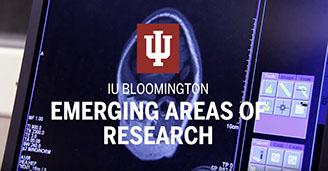
Fall, 2016

Dr. James' handwriting research was featured in an article in Community Health entitled "Why your kids should learn to write by hand."
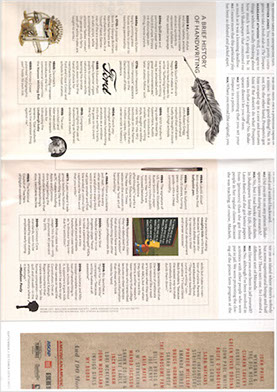
Recent CANLab research was cited in a handwriting retrospective in Mother Jones Magazine.

June, 2016
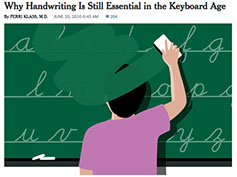
A version of this article appeared on page D6 of the NY Times New York edition on June 6, 2016 with the headline, "Writing to Learn."
August, 2015
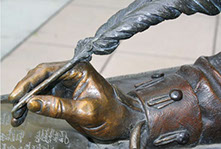
Does handwriting have a future?
Dr. James was a guest on Australian National Radio's (ABC) popular current events program, Future Tense to discuss the future of handwriting in education.


"James and Engelhardt found that writing is particularly instrumental in the cognitive development of pre-literate 5 year olds. The kids, who were learning the alphabet, wrote, traced, and typed letters. MRI scans found that the kids who had written letters were able to perceive the letters better, helping them to read at better rates compared to the typers and tracers."
Read more in a TIME magazine interview with Dr. James: "Are There Really Benefits to Writing Things by Hand?"
February, 2015

"Should Kids Learn Handwriting? An IU Scientist Thinks So."
Read Dr. James' interview in the Feb/March issue of Bloom Magazine

"Can keyboards and touch screens harm our development and creative wellbeing? There’s new research to suggest it might." Learn more by listening to Dr. James' interview on the BBC news program, "The Forum."
November, 2014
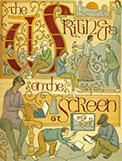
Dr. James' research on the relationship between writing and letter
recognition is featured in a November, 2014 New Scientist article,
September, 2014

Dr. Karin James discusses how handwriting affects kids' brain development on Sound Medicine, Public Radio's Weekly Magazine About Medicine and Health.

August, 2014
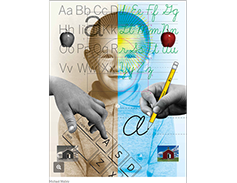
"Does handwriting matter?" Dr. Karin James' research was part of a New York Times feature on the effects of the diminished emphasis on teaching handwriting skills to school children.
June, 2014
“We have recently shown that when children look at letters, the activity in parts of their brains becomes more like activity seen in literate adults, but only after they have had practice printing letters.”
Dr. James' handwriting research is highlighted in the IU Newsroom Fall, 2014 Back-to-School-issue
December, 2012
Drs. Tom & Karin James' collaborative "Pokemon" research is discussed in an IU Newsroom release:
"Pokemon has since provided a rich testing ground for a theory of facial cognition that until now has been difficult to support. With the use of cutting-edge neuroimaging, the study challenges the prevailing theory of face recognition by offering new evidence for a theory that face recognition depends on a generalized system for recognizing objects, rather than a special area of the brain just for this function."
January, 2012

"IU neuroscientist Karin Harman James to discuss research with Indiana senators:"

During the 2012 Handwriting in the 21st Century Educational Summit in Washington, DC, Dr. James presented the results of a series of studies using functional Magnetic Resonance Imaging (fMRI) that suggest that self-generated action, in the form of printing letters by hand, is a crucial component in setting up brain systems for reading acquisition.
&
Dr. James discusses the importance of handwriting in child development on Fox News network affiliate in Washington DC while attending the 2012 Handwriting in the 21st Century Educational Summit in Washington, DC.
September, 2011
Dr. James was interviewed for a feature entitled "Why Schools Should Keep Teaching Handwriting, Even If Typing Is More Useful" The feature was in STATEIMPACT INDIANA, a collaboration of WFIU and Indiana Public Broadcasting stations whose objective is to explain the effects of state education policy on people's lives.

June, 2011
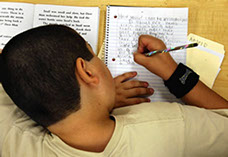
"For children, handwriting is extremely important. Not how well they do it, but that they do it and practice it," said Karin Harman James, an assistant professor in the department of psychological and brain sciences at Indiana University.
"Typing does not do the same thing."
Read more in the Chicago Tribune article:
October, 2010

"It seems there is
something really important
about manually manipulating and drawing out two-dimensional things we see all the time,"
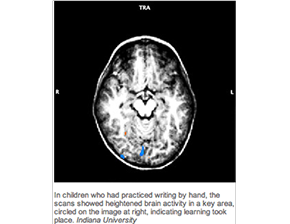
says Dr. Karin Harman James. A CANLab study is used to illustrate the benefits
of handwriting in the Wall Street Journal article "Handwriting Trains the Brain."
Dr. James' handwriting research was featured in the

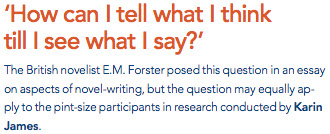
Indiana University 2010 Annual Report (Page 11.)


Cognition & Action Neuroimaging Lab | 1101 E. 10th Street, Bloomington, IN 47405 | (812)856-7237 | canlab1@indiana.edu